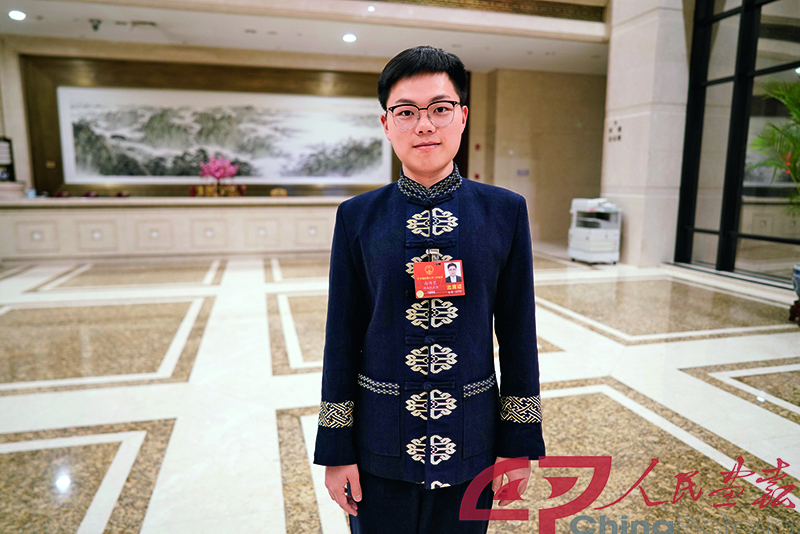Xiang Weiyi: Rural Vitalization Needs Millennials

At 25, Xiang Weiyi is a millennial deputy to the 13th National People's Congress (NPC), China's national legislature. He now works as a village official in Cili County, Hunan Province. On March 2, 2018, on a bullet train to Beijing to attend the first session of the 13th NPC, the young man from the Tujia ethnic group enthusiastically introduced sweet potato vermicelli, red rice and tea from his hometown to other passengers.
Surrounded by forested hills, Xiangbizui Village lies in the Wuling Mountains in Hunan Province. Four years ago, Xiang graduated from college and was selected by the province to become assistant secretary of the village's Party branch. At that time, most of his peers were opting to take jobs in big cities, but Xiang decided it would be cooler to return to the countryside.
Then, the average age of village officials in Xiangbizui was more than 40 years old. When villagers first saw the young man, they couldn't help but wonder: Was the boy planning to show up and then take off? Xiang calmed their suspicions with action: He lived and worked together with villagers to harvest citrus fruits. He helped villagers understand the new rural endowment insurance, and carefully explained to them about policies and regulations related to the insurance. When arguments occurred between villagers, he patiently reconciled their disputes. Gradually, more and more people praised him for his patience and hardworking attitude.
“A sense of accomplishment spontaneously overtakes me when I see them gradually accepting me,” Xiang beamed. “It is especially heartwarming when villagers invite me to their homes for Spring Festival.”
Thanks to the village committee's efforts over the past three years, more and more villagers have been lifted out of poverty. In Xiangbizui Village, inhabited by a total of 401 households, implementation of policies such as poverty alleviation through relocation, accurate pairing assistance and other measures has reduced poor households from 27 to 7. Xiang is confident that the rest will be lifted out of poverty this year.
To enrich the villagers' cultural lives, the Excellent Culture Promotion Association of Xiangbizui Village was established. It organized Party members' classes, women's classes and children's traditional culture classes. It invited calligraphers from around the province to give free calligraphy lectures. During the Spring Festival gala in the village, children and the elderly all received 200 yuan in red envelopes from the village's earnings from selling high-quality agricultural products such as citrus fruits.
After being elected a NPC deputy, Xiang realized that he was no longer responsible for just a village, but grassroots levels nationwide. To live up to the people's expectations, he visited local government departments and former NPC deputies as well as the villagers to learn their most urgent needs.
“Today, medical and educational issues make up most of their needs,” Xiang said. “What concerns the people most is increasing the coverage and reimbursement ratio for the new rural cooperative medical care. ”At this year's NPC session, Xiang presented suggestions on the adjustment of the amount of insurance and the proportion of reimbursement and expressed hope that relevant policies benefiting more people would be passed as soon as possible.
Xi Jinping, general secretary of the Communist Party of China (CPC) Central Committee, put forward the rural vitalization strategy in the report delivered at the 19th CPC National Congress, which excited Xiang. “We believe that after implementing the rural vitalization strategy, our countryside will become more beautiful, and farmers' lives will become richer.” As a millennial village official, Xiang pays special attention to how he can provide qualified personnel for the implementation of the strategy. He hopes to retain rural personnel by perfecting the supervision and supporting system of village officials.
“The countryside desperately needs young people full of vigor and vitality,” Xiang said. “The vitalization of the countryside requires participation of young people.”